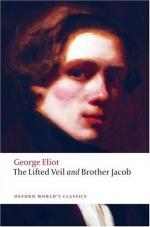In after-days I thought with bitter regret that if I had foreseen something more or something different—if instead of that hideous vision which poisoned the passion it could not destroy, or if even along with it I could have had a foreshadowing of that moment when I looked on my brother’s face for the last time, some softening influence would have been shed over my feeling towards him: pride and hatred would surely have been subdued into pity, and the record of those hidden sins would have been shortened. But this is one of the vain thoughts with which we men flatter ourselves. We try to believe that the egoism within us would have easily been melted, and that it was only the narrowness of our knowledge which hemmed in our generosity, our awe, our human piety, and hindered them from submerging our hard indifference to the sensations and emotions of our fellows. Our tenderness and self-renunciation seem strong when our egoism has had its day—when, after our mean striving for a triumph that is to be another’s loss, the triumph comes suddenly, and we shudder at it, because it is held out by the chill hand of death.
Our arrival in Prague happened at night, and I was glad of this, for it seemed like a deferring of a terribly decisive moment, to be in the city for hours without seeing it. As we were not to remain long in Prague, but to go on speedily to Dresden, it was proposed that we should drive out the next morning and take a general view of the place, as well as visit some of its specially interesting spots, before the heat became oppressive—for we were in August, and the season was hot and dry. But it happened that the ladies were rather late at their morning toilet, and to my father’s politely-repressed but perceptible annoyance, we were not in the carriage till the morning was far advanced. I thought with a sense of relief, as we entered the Jews’ quarter, where we were to visit the old synagogue, that we should be kept in this flat, shut-up part of the city, until we should all be too tired and too warm to go farther, and so we should return without seeing more than the streets through which we had already passed. That would give me another day’s suspense—suspense, the only form in which a fearful spirit knows the solace of hope. But, as I stood under the blackened, groined arches of that old synagogue, made dimly visible by the seven thin candles in the sacred lamp, while our Jewish cicerone reached down the Book of the Law, and read to us in its ancient tongue—I felt a shuddering impression that this strange building, with its shrunken lights, this surviving withered remnant of medieval Judaism, was of a piece with my vision. Those darkened dusty Christian saints, with their loftier arches and their larger candles, needed the consolatory scorn with which they might point to a more shrivelled death-in-life than their own.




